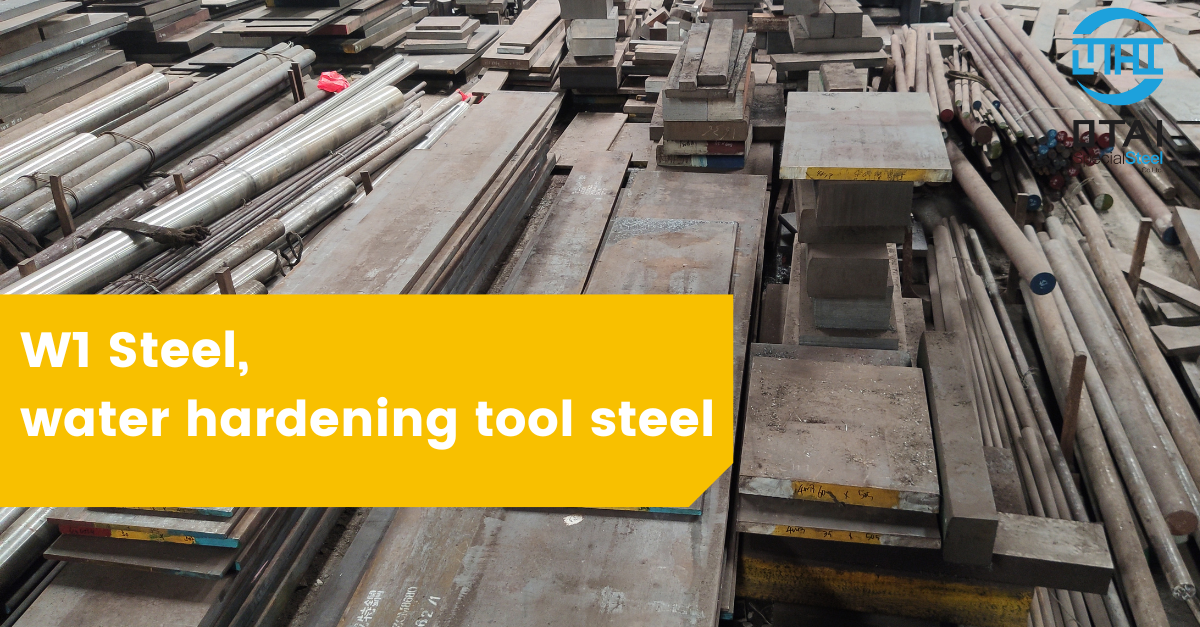What is W1 Steel ?
W1 tool steel is often referred to a water-hardening tool steel. Grade W1 steels belong to ASTM A686 standard. In the same group there is another grade W2 steel. W 1 steel is renowned for its unique combination of wear resistance, toughness, and machinability. Its high carbon content ensures excellent hardenability, allowing it to achieve Rockwell hardness levels of 62-64 HRC after heat treatment. This W 1 steel is a testament to the advancements in metallurgy, and it offers a balance between durability and workability.

1. Supply Range W-1 Steel
W1 Round Bar or Rod: diameter 16mm – 300mm
Steel Plate and W1 tool steel flat bar: thickness 16-200mm x width 300-900mm
Surface Finish: Black Surface, Milled Surface or Polished Surface as per given requirements.
MOQ: 1000 KGS
2. Relevant W 1 Tool Steel Specification and Equivalent Steel Grade
| Country | USA | German |
| Standard | ASTM A686 | EN ISO 4957 |
| Grades | W1 | 1.1545 / C105U |
3. ASTM W-1 Tool Steel Chemical Composition and Equivalent
| Type | Grade | C | Mn | Si | P | S | Cr | V | W | Mo | Cu | Ni | ||||||
| min | max | min | max | min | max | max | max | min | max | min | max | max | max | max | max | |||
| T72301 | W1 | A | B | B | 0.10 | 0.40 | 0.10 | 0.40 | 0.030 | 0.030 | . . . | 0.15 | . . . | 0.10 | 0.15 | 0.10 | 0.20 | 0.20 |
| Suffix | Carbon Range, % | Suffix | Carbon Range, % | |
| 8 | 0.80–0.90 | 10 | 1.00–1.10 | |
| 8½ | 0.85–0.95 | 10½ | 1.05–1.15 | |
| 9 | 0.90–1.00 | 11 | 1.10–1.20 | |
| 9½ | 0.95–1.05 | 11½ | 1.15–1.25 |
4. W1 Tool Steel Properties
Physical Properties
- Density: 7.83 g/cm3
- Melting Point: 1435°C
- Tensile Strength: Ultimate – 1680 MPa, Yield – 1500 MPa
- Hardness: Rockwell C – 50.0-51.0
W 1 Steel Mechanical Properties
W1 tool steel exhibits excellent mechanical properties, making it a preferred choice for tools that require high strength and durability. Its high tensile strength ensures that tools made from this steel can withstand significant stress without deformation.
| Properties | Metric | Imperial |
|---|---|---|
| Tensile strength, ultimate | 1680 MPa | 244000 psi |
| Tensile strength, yield | 1500 MPa | 218000 psi |
| Poisson’s ratio (25°C) | 0.27-0.30 | 0.27-0.30 |
| Elongation at break | 3.50% | 3.50% |
| Bulk modulus | 140 GPa | 20300 ksi |
| Shear modulus | 80.0 GPa | 11600 ksi |
| Elastic modulus | 190-210 GPa | 27557-30458 ksi |
| Charpy impact, unnotched | 86.0 J | 63.4 ft-lb |
| Hardness, Brinell (converted from Rockwell C Hardness) | 498 | 498 |
| Hardness, Knoop (converted from Rockwell C Hardness) | 558 | 558 |
| Hardness, Rockwell C | 50.0-51.0 | 50.0-51.0 |
| Hardness, Vickers (converted from Rockwell C Hardness) | 531 | 531 |
| Machinability (based on AISI 1212 steel as 100% machinability) | 40 | 40 |
W1 Tool Steel Thermal Properties
W1 alloy steel has a specific heat capacity and thermal conductivity that ensures it remains stable under varying temperature conditions. This makes it suitable for tools used in high-temperature environments.
5. Forging of W1 Alloy Tool Steel
W1 tool steel can be forged at temperatures ranging from 1900 F to 1550 F. It’s essential not to forge below 1500 F to maintain its structural integrity. Proper forging ensures the steel’s grain structure is refined, enhancing its overall strength and toughness.
6. ASTM A686 W-1 Steel Heat Treat
- Hot Working
W 1 steel material can be hot-worked.
- Cold Working
W1 tool steel in the annealed condition have very good ductility and can be easily cold worked using conventional methods.
- Annealing W1 Tool Steel
Annealing has to be performed at 760°C (1400°F) followed by slow furnace cooling at 4°C (40°F) per hour or less.
- Tempering
Tempering of the W1 steels is performed at 177-343°C (350-650°F) to realize Rockwell C hardness of 64 to 50.
7. What is W1 Steel Used For
Industrial Applications
- Cutting Tools: Drill bits, taps, and reamers.
- Woodworking Tools: Chisels, planes, and saws.
- Metal Forming Tools: Dies, punches, and screwdrivers.
- Blades: For food processing equipment, knife, razors, and industrial cutters.
Specialized Applications
- Given its unique properties, W1 tool steel is also used in:
- Blacksmithing: For crafting artisanal tools and implements.
- Cold Heading: For creating fasteners and rivets.
- Embossing Taps: Used in decorative metalwork.
8. Our Customers





If you need quote for W1 or W2 tool steel price, we can offer you the latest price asap. Otai is one reliable W1 tool steel supplier for you, as well as other tool steel and alloy steel materials.
FAQs
- What makes W1 steel unique?
- W1 steel is known for its water hardening properties, making it distinct from other carbon steel alloys.
- Is W1 steel suitable for kitchen cutlery?
- Yes, its durability and resistance to wear make it ideal for cutlery.
- How is W1 steel hardened?
- It’s hardened by heating and then quenching in water.
- Can W1 steel be welded?
- Yes, it can be welded using all standard techniques.
- What is the carbon content in W1 steel?
- The carbon content ranges from 0.8% to 1.25%, and you can refer to the above chemical composition table.

